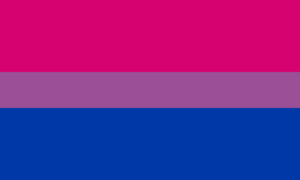Saying “Bye” to Bisexual Erasure

“You’re just confused; You’ll pick a side eventually.” These are the words that bisexuals dread. It is this kind of thinking, often called bisexual erasure, that promotes the idea that the term “bi” isn’t a valid label.
According to the global market research group Kantar TNS, as of 2017, 4% of the U.S. population identifies as bisexual, and these numbers continue to grow. But despite the fact that Americans are increasingly coming out as bisexual, the destructive patterns of erasure and ignorance still plague society.
In her article “5 Myths About Bisexuality that Contribute to Bi Erasure,” Kyli Rodriguez-Cayro suggests that people who identify this way often feel as though they are “stuck in limbo – not ‘gay’ enough for some, and not ‘straight’ enough for others.”
Misconceptions that contribute to this harmful stereotyping often center around the common inability to believe that it is possible for a person to be attracted to more than one gender simultaneously. These “pick a side” comments are often accompanied with the incorrect belief that a bisexual person’s choice in partner alters their sexuality in some way.
It is not uncommon for people to suggest that when someone who identifies as bisexual is involved romantically with someone of the opposite gender, their label changes to “straight.” The same goes for bisexuals dating someone of the same sex; they are often perceived as “gay.” These are nothing more than stereotypes. Bisexuals do not “become” gay or straight based on the person they are dating, because being “bisexual” is in itself its own complete sexuality. Although sexuality is fluid, those who identify as bisexual will continually be capable of experiencing attraction toward any gender; this is what makes them distinct.
Although it may be difficult for some people to grasp the idea that bisexuality is indeed a real, and valid, label, for the sake of queer people’s mental health is it important to work toward erasing the stigma and confusion surrounding bisexuality.
Being told one’s sexuality is illegitimate can be an incredibly hard experience for someone to endure, and recent studies by the Bisexual Research Center have shown that people who identify as bisexual suffer from the highest rates of poor mental health, more than gay or straight people.
Other harmful accusations such as persistent unfaithfulness or promiscuity are often hurled at bisexuals as well, which only contribute to American society’s tendency to disregard bisexuality as a valid label.
Unfortunately, these insults and misconceptions stem from both the LGBTQ+ community and the straight community, leaving many bisexuals feeling excluded and misunderstood on both sides.
Working toward a more holistic understanding of bisexuality in all of its complexity is a worthy goal, for the sake of the millions of U.S. citizens who claim this label as their own. Bisexual erasure benefits no communities, because it prevents representation from being widespread, allowing harmful thought patterns to continue.
No matter your labels, no matter your sexuality, know that there are others going through these experiences too. Eradicating bisexual erasure brings people one step closer to building a world full of people who accept one another for who they are.
